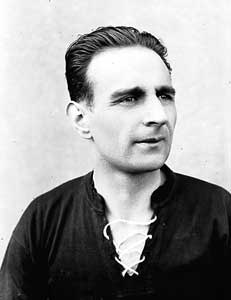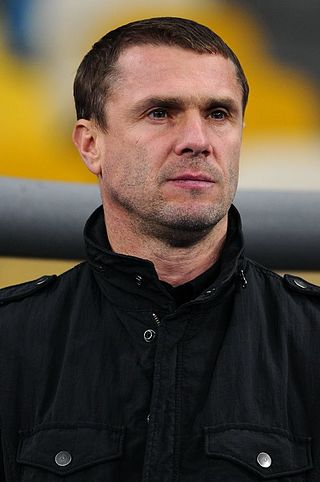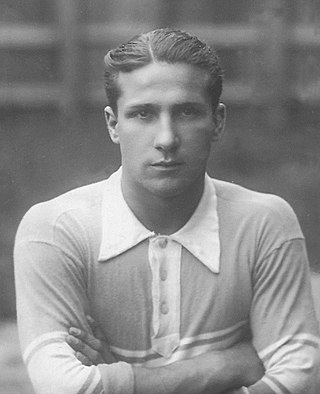
Ferenc Puskás was a Hungarian footballer and manager, widely regarded as one of the greatest players of all time and the sport's first international superstar. A forward and an attacking midfielder, he scored 84 goals in 85 international matches for Hungary and later played four international matches for Spain as well. He became an Olympic champion in 1952 and led his nation to the final of the 1954 World Cup. He won three European Cups, ten national championships and eight top individual scoring honors. Known as the "Galloping Major", in 1995, he was recognized as the greatest top division scorer of the 20th century by the IFFHS. Scoring 806 goals in 793 official games during his career, he is the seventh top goal scorer of all time by the RSSSF.

Alfredo Stéfano Di Stéfano Laulhé was a professional footballer and coach who played as a forward, regarded as one of the greatest footballers of all time. Nicknamed "Saeta Rubia", he is best known for his achievements with Real Madrid, where he was instrumental in the club's domination of the European Cup and La Liga during the 1950s and 1960s. Along with Francisco Gento and José María Zárraga, he was one of only three players to play a part in all five European Cup victories, scoring goals in each of the five finals. Di Stéfano played international football mostly for Spain after moving to Madrid, but he also played for Argentina and Colombia.

Ferencvárosi Torna Club, commonly known as Ferencváros, Fradi, FTC is a Hungarian professional football club based in Ferencváros, Budapest, that competes in the Nemzeti Bajnokság I, the top flight of Hungarian football. Ferencváros was founded in 1899 by Ferenc Springer and a group of local residents of Budapest's ninth district, Ferencváros. Ferencváros is best known internationally for winning the 1964–65 edition of the Inter-Cities Fairs Cup after defeating Juventus 1–0 in Turin in the final. Ferencváros also reached the final in the same competition in 1968, when they lost to Leeds United, as well as the final in the 1974–75 season of the European Cup Winners' Cup, losing to Dynamo Kyiv.

Sándor Péter Kocsis was a Hungarian footballer who played for Ferencvárosi TC, Budapest Honvéd, Young Fellows Zürich, FC Barcelona and Hungary as a striker. During the 1950s, along with Ferenc Puskás, Zoltán Czibor, József Bozsik and Nándor Hidegkuti, he was a member of the Mighty Magyars. After the 1956 Hungarian Revolution, he moved to Spain where he became a member of the FC Barcelona team of the late 1950s.

Gyula Zsengellér was a Hungarian footballer who played as a striker. A legend of Újpest FC, he is most famous for his part in taking the Hungary national team to the 1938 World Cup Final. He was that tournament's second-highest scorer, behind Leonidas of Brazil.

Zoltán Gera is a Hungarian former professional footballer who played as a midfielder for Fulham, Pécsi Mecsek and Harkány SE, as well as enjoying two spells at Ferencváros and West Bromwich Albion.

Serhiy Stanislavovych Rebrov is a Ukrainian professional football manager and former player who played as a striker. He is currently the manager of Ukraine.

György Sárosi was a Hungarian footballer. Sárosi was a complete footballer renowned for his versatility and technique among other things, and he played in several positions for Ferencváros and the Hungary national team. Essentially a second striker, he could also operate in midfield or central defence, and he helped Ferencváros win five Hungarian league titles between 1932 and 1941. He is considered one of the greatest players of the pre-war era.

Ferenc Szusza was a Hungarian footballer who played as a forward. He was a top division player for Újpest FC from 1941 to 1960. He made 24 appearances for the Hungary national team and was a four-time champion with Újpest FC.

Tibor Nyilasi is a retired Hungarian football player and manager. A midfielder, he signed with Ferencváros in 1972 and played there until transferring to Austria Wien in 1983. He made 70 appearances for the Hungary national team from 1975 to 1985, scoring 32 goals. He played in the 1978 FIFA World Cup and the 1982 FIFA World Cup. After he retired as a player he was manager of Ferencváros. He has more recently also worked for the Hungarian Football Federation and is regularly appearing as a pundit on the Hungarian sports channel 'Sport TV'.

Ferenc Hirzer known in Hungarian as Ferenc Híres was a Hungarian football player and manager, who played as a forward during the 1910s and 1920s; he is perhaps best known for his time with Italian side Juventus. He also played for the Hungary national football team thirty-two different times, scoring fourteen goals.
Ladislau Ludovic Bonyhádi was a Romanian football player of Hungarian ethnicity. He was one of the legends of UTA Arad, being the top-goalscorer of Liga I twice, in 1947 and 1948. In the 1947–48 season, he scored 49 goals, which is still a record for Romanian first league, despite that Dudu Georgescu scored 47 goals in the 1976 -1977 season whom was regarded as European record, until Messi scored 50 goals in the 2011–2012 season. He earned also three caps for the Romania national side. After his last season at ITA Arad, he went to Hungary, and played for a few teams in a lower league. In 1958, he became coach at the class teams from the neighboring country.
Refik Shaban Resmja was an Albanian professional footballer.
Kostas Choumis was a Greek-Romanian football player who played as a striker. He is often regarded in Greece and Romania as one of the greatest strikers in the 1930s.

Dániel Böde is a Hungarian professional footballer who plays for Paksi FC as a forward.

Iuliu Bodola was a Romanian-Hungarian footballer who played as a striker. He represented both the Romania and Hungary national team at internationally level. His nickname was Duduş/Dudus. He is Romania's third all-time top goalscorer, and he is also the all-time top goal scorer of the Balkan Cup.
The 2014–15 season was Pécsi Mecsek Football Club's 50th competitive season, 4th consecutive season in the OTP Bank Liga, where it finished 11th and 64th year in existence as a football club. Among the championship, the team competed in the Hungarian Cup and the Ligakupa. Both competitions saw Pécs MFC eliminated in the round of 16.
1908 Szentlőrinci AC KSE is a Hungarian football club from the town of Pestszentlőrinc, Budapest.
Barnabás Varga is a Hungarian professional footballer who plays for Nemzeti Bajnokság I club Ferencváros and Hungary national team as a forward.
Lyubomir Angelov was a Bulgarian footballer and manager who played as a forward for the Bulgaria national team. With 26 goals in 44 caps for Bulgaria, he ranks as the nation's fifth-highest all-time top goalscorer.















